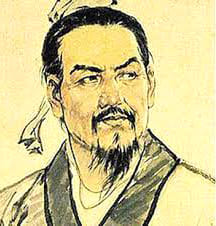Explore the life and philosophy of Han Feizi, a key figure in the development of Chinese Legalism during the Warring States period (475–221 BCE). Discover his teachings on law, governance, and human nature as outlined in his influential work ‘Han Feizi.’
Han Feizi
Han Feizi was a Chinese philosopher and writer who lived during the Warring States period (475-221 BCE) in ancient China. He was a prominent legalist philosopher and one of the central figures in the development of Chinese legalism.
Little is known about his life and personal details, and what remains of his writings is largely attributed to the Han dynasty scholar Liu Xiang. Han Feizi is said to have been born in the state of Han in present-day Henan province, around 280 BCE. It is believed that he was a minister in the state of Qin and an advisor to the king. He is said to have been an influential figure in the unification of China under the Qin dynasty (221-206 BCE).
Han Feizi’s most famous work is also known as the Han Feizi, a collection of essays and writings on legalism, political philosophy, and governance. The book is said to have been written by Han Feizi himself and was compiled by his disciples after his death. The Han Feizi is considered one of the classic texts of Chinese legalism, and its ideas have had a lasting impact on Chinese political thought.
In his writings, Han Feizi argued that the ruler should be absolute and supreme and that the people should be ruled through strict laws and punishments. He believed that the ruler should not be bound by moral principles, but should instead act in the interest of the state. He argued that rulers should be ruthless and harsh in their governance, in order to maintain order and stability.
He also believed in the importance of espionage and control over the people. He thought that the ruler should use spies and secret police to monitor the population and maintain control. He believed that rulers should also use propaganda to control the people’s thoughts and beliefs.
Despite his emphasis on strict control and governance, He also believed in the importance of education and the role it plays in maintaining stability. He argued that the ruler should educate the people in order to maintain order and prevent rebellion.
His ideas had a significant impact on the development of Chinese legalism, and his writings have been studied and debated for centuries. While his ideas were often criticized for their emphasis on strict control and the rejection of moral principles, they have also been praised for their realism and practicality.
In conclusion, Han Feizi was a prominent philosopher and writer in ancient China who made significant contributions to the development of Chinese legalism. His ideas have had a lasting impact on Chinese political thought and continue to be studied and debated to this day. 0 0 0.
Han Feizi: Comprehsnive Biography
Han Feizi (c. 280–233 BCE) was a notable Chinese philosopher and writer who emerged during the Warring States period (475–221 BCE), a time of great political upheaval and intellectual development in ancient China. He is best known as one of the leading figures in the development of Legalism, a school of thought that emphasized strict laws, centralized authority, and the importance of state power. Han Feizi’s ideas had a profound impact on the philosophy of governance in China and played a crucial role in shaping the political landscape of the Qin Dynasty.
Early Life
He was born into a noble family in the state of Han, one of the many states competing for power during the Warring States period. His exact birth year is uncertain, but he is believed to have been born around 280 BCE. Han Feizi received an education in Confucian philosophy, which he later critiqued and reinterpreted through the lens of Legalism.
He was an intellectual prodigy, well-versed in various schools of thought, including Confucianism, Daoism, and Mohism. Despite his Confucian education, Han Feizi became disillusioned with the moralistic approach of Confucianism and sought a more pragmatic solution to the political chaos of his time.
Philosophical Development
His philosophical development was significantly influenced by his interactions with other thinkers, particularly the Legalist philosopher Shang Yang. Shang Yang’s ideas about strict laws and governance resonated with Han Feizi, leading him to adopt and refine Legalist principles.
Han Feizi articulated his thoughts in a series of essays and treatises, which were later compiled into the text known as the ‘Han Feizi.’ This work serves as a comprehensive exposition of Legalist philosophy and covers various topics, including law, governance, and human nature.
Key Themes and Concepts:
Human Nature: He believed that human nature is inherently self-interested and that individuals act primarily out of desire for personal gain. This view led him to advocate for a strong, authoritarian government to control and regulate society.
Law and Order: A central tenet of Han Feizi’s philosophy is the importance of law as the foundation of a stable and prosperous society. He argued that laws should be clear, enforced consistently, and applied equally to all citizens, regardless of their social status.
Centralized Authority: Han Feizi emphasized the need for a centralized government with absolute power. He believed that only a strong ruler could maintain order and effectively implement policies for the benefit of the state.
Punishment and Reward: In Han Feizi’s view, effective governance relies on a system of rewards and punishments. He argued that rulers should incentivize loyalty and obedience through rewards while punishing disobedience and criminal behavior harshly.
Realpolitik: His philosophy reflects a pragmatic approach to governance, prioritizing state power and stability over moral considerations. He believed that rulers should be willing to use any means necessary, including deception and coercion, to maintain their authority.
Influence and Legacy
His ideas were instrumental in shaping the philosophy of the Qin Dynasty, which became the first unified Chinese empire under Emperor Qin Shi Huang. The Legalist principles espoused by Han Feizi were put into practice during the Qin dynasty’s rule, leading to the establishment of a highly centralized and authoritarian government.
However, the harsh application of Legalist policies, including severe punishments and strict censorship, ultimately contributed to widespread discontent among the populace. Following the fall of the Qin Dynasty, Legalism fell out of favor, and Confucianism regained prominence as the dominant ideology in China.
Despite this decline, his contributions to political philosophy and governance remain significant. His ideas on law and authority continue to resonate in discussions of governance, particularly regarding the balance between individual rights and state power.
Conclusion
His legacy as a philosopher and writer endures as one of the central figures in the development of Chinese Legalism. His insights into human nature, law, and governance provide a pragmatic framework for understanding the complexities of political authority and statecraft. While the harsh methods advocated by Han Feizi have sparked debates about the ethics of governance, his work continues to be studied and analyzed, reflecting the enduring relevance of his ideas in contemporary discussions on law and politics. Through the ‘Han Feizi,’ Han Feizi remains a pivotal voice in the history of Chinese philosophy, shaping the discourse on power, control, and the nature of authority for generations to come. 0 0 0
Brief Data on Han Feizi
- Full Name: Han Feizi (韓非子)
- Born: Circa 280 BCE, State of Han, Warring States period, China
- Died: Circa 233 BCE
- Era: Warring States period
- Occupation: Philosopher, Writer
- Key Contributions: Author of the ‘Han Feizi,’ a foundational text of Legalist philosophy.
- Famous Works: ‘Han Feizi’ (韓非子)
- Legacy: A central figure in Legalism, his ideas on law and governance significantly influenced the political landscape of the Qin Dynasty.
FAQs About Han Feizi
Q1: What is Han Feizi best known for?
A1: He is best known for his work ‘Han Feizi,’ which outlines the principles of Legalism, emphasizing the importance of strict laws, centralized authority, and the nature of human behavior.
Q2: What are the main themes in the ‘Han Feizi’?
A2: Key themes include human nature as self-interested, the necessity of law and order, the need for centralized authority, and the use of rewards and punishments to maintain social stability.
Q3: How does Han Feizi’s philosophy differ from Confucianism?
A3: While Confucianism emphasizes moral virtues and social harmony, His Legalism advocates for a pragmatic, authoritarian approach to governance, focusing on law and control rather than ethics.
Q4: What impact did Han Feizi have on Chinese history?
A4: His ideas significantly influenced the Qin Dynasty, leading to the establishment of a centralized and authoritarian government. His principles laid the foundation for a system of governance that prioritized state power and control.
Q5: Is the ‘Han Feizi’ text still relevant today?
A5: Yes, the ‘Han Feizi’ remains relevant, particularly in discussions of governance, law, and authority, offering insights into the complexities of statecraft and the balance between individual rights and government power.
N. B. This article originally belongs to the book, ‘Brief Biographies of Ancient Thinkers and Writers‘ by Menonim Menonimus.
Books of Biography by M. Menonimus:
- The World Writers-Brief Biographies
- Introduction to World Writers
- Introduction to World Personalities
- Love of Reputed Persons ..
Additional Searches:











